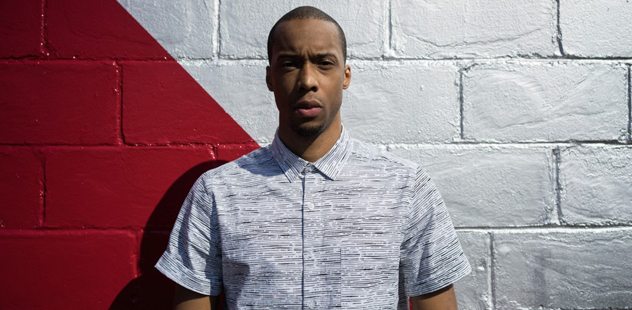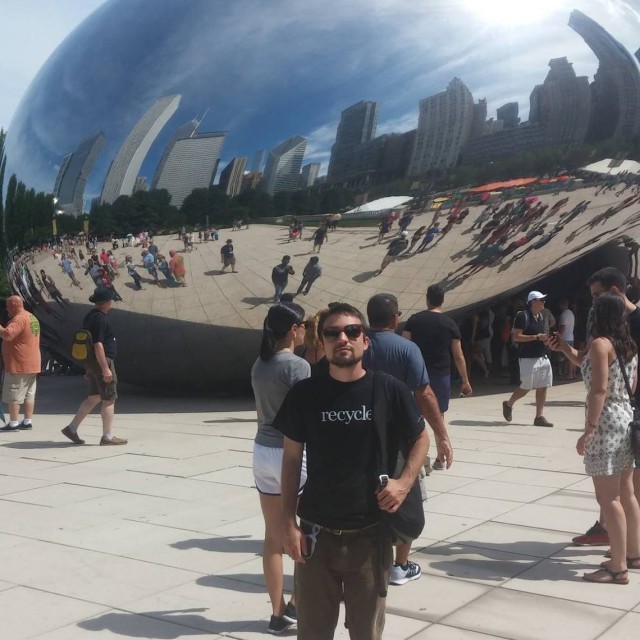 Photo by Rick Williams
Photo by Rick Williams
Detroit MC/Producer Black Milk Lands in Sacramento on Continent-Wide Tour
Curtis Cross, aka Black Milk, is, if anything, a builder of worlds. Spin a copy of his latest album, If There’s a Hell Below, and you’ll find yourself in the heart of one: aural labyrinths of driving percussion and pulsating synths, stacked high with the choicest vinyl cuts from bygone eras. Black Milk’s visions of a Detroit upbringing come to life in hyper-stylized high definition, from the dirge-like guitar loops of “Leave the Bones Behind” to the Cybotron-influenced techno groove of “Detroit’s New Dance Show.”
Deft evocation of time and place through production is Black Milk’s natural state of being, and at the beginning of his career, technical wizardry had been his primary focus. Coming up during a transitional phase in his city’s musical scene and a sea-change in the world of hip-hop at large, his dedication to the art of crate-digging and classic soul set him apart from his more trendy peers. In the long run, it has paid off immensely; after more than a decade of experimenting with different sound palettes (‘80s-style techno on 2008’s Gtronic, a full live-band orchestration on 2010’s Album of the Year), Black Milk has achieved a near-perfect recipe.
Nowhere is this more evident than on his back-to-back releases of 2013 and 2014, No Poison No Paradise and If There’s a Hell Below. These records are the soundtrack to a vision falling into place, complete with the flow to match. Although Black Milk’s commanding lyrics have always provided a potent complement to his unique beats, his latter work shows a deep trend toward the introspective. Here, his rhymes seem to uncover, once and for all, the magnetizing narrative lying at the core of his entire discography, one filled with despair as well as triumph.
This steady rise on a tide of personal growth could not have come at a better time: Black Milk is poised to attack in 2015 with an extensive North American tour beginning March 19, backed by live instrumentation from his band, Nat Turner.
In his spare moments, he puts the finishing touches on new material while setting up his record label, Computer Ugly. Having reached a new creative peak, he aims to make this year one of collaboration and exposure, adding to the swelling ranks of domestic fans and opening a new chapter in the Black Milk saga. On April 12, Sacramentans will get the chance to catch his show at Harlow’s, marking the first time he’s made a local appearance. In early March, we dropped him a line to catch up on the latest from this renaissance man from the Renaissance City.
So you’re gearing up for a huge North American tour right now. How do you get your head in the game?
I’m trying to get a lot of studio work done right now before we hit the road. It’s pretty impossible for me to create when I’m on tour…so I have to get as much done as I can while I’m here at home. Probably a week out, we’re gonna get the band together and get rehearsals in. But right now I’m just trying to work, bang out as many beats as I can, and hopefully create a few singles that I can leak out there in the next couple months.
As far as tours go, is this the biggest undertaking for you so far?
You know, it is kinda big, but when I first started doing tours and shows in general, I was spending a lot of my time overseas, in Europe, and different places. I actually just started touring heavily in the States, in the last three years. I’ve always done like the major cities—New York, L.A.—but these last three years, I’ve been trying to hit a lot of U.S. cities. I’m hoping that this tour will be really successful, with how much music as I’ve dropped in the last couple years, you know, from the solo albums to the little projects that I’ve dropped in between, so yeah, I’m hoping people come out and support, have a good time. I know me and the band are gonna do our thing and put on as crazy a show as we possibly can. I think this will probably be my first time touring the States in the late winter/early spring, so when the weather finally breaks and it’s a little warmer, they’ll really want to come outside and see the show.
Your past two records, track for track, seem like they have the most complex beats and lyrical delivery of all your work. Is it hard to translate that into a show with a live band?
Not really. The reason I say it’s not that hard is because, for one, I’ve been hitting the road for a good five or six years now. We’ve been building our chemistry up for a while, so we’re not brand new to hitting the stage or playing together. And, you know, they know my ear, we all kind of have the same vibe. It’s pretty easy to bring some new stuff to the table for the band, and everybody locks in. What’s more of a challenge is arranging the set; sometimes half of the songs we play in our set are played totally different than the actual studio recording. The audience might not even know what song we’re playing until we reach the hook, because we’re flipping totally different.
You used mostly live instrumentation on your 2010 album Album of the Year. Has there been more of that approach at all on your subsequent records?
Yeah, there’s a lot of musicianship present on the records. Album of the Year was definitely the most heavily live instrumentation-based out of all my albums. But yeah, I still keep a little bit of my musician friends involved with the production. On the last two projects, I actually wanted the production to feel more like a drum machine, somewhat more like my older work. I’m still incorporating a lot of instrumentation, but without it being as noticeable. Some stuff that might be being played live on the album is not as noticeable, either by the way I’ve mixed it or EQed it, because I wanted it to sound more like a sample.
There’s a lot of interesting samples on your last two records. I noticed stuff like Mort Garson and Gershon Kingsley, these experimental dudes from the early ‘70s, mixed alongside Curtis Mayfield and all these wonderful soul records. How did these influences come about?
Growing up in the environment I did, it’s natural as an artist to have an interest in all of those different styles and genres of music, no matter what your core is, no matter what you do on the day-to-day, you will find that in Detroit, you’ll see people from the hip-hop scene mixed up with some of the artists in the electronic scene and vice-versa. People in the rock scene get mixed up, too. It’s kind of just how it is. It’s a musical city with a rich history—the techno scene, Motown, the stuff we’ve done in hip-hop music. I’m from the generation of Detroit artists that’s like late ‘90s, early ‘00s. I was soaking up all of the history that happened before my era.
You recorded your latest work while you were living in Texas. Do you find it easier to reflect on your life growing up in Detroit when you’re far away?
Maybe. Before I moved, I was already working on No Poison No Paradise, so I was already kind of in that mindset before I left Detroit, but I don’t know if me leaving amplified it [laughs]. It was just a natural progression, taking the way I write songs and making it a little more personal, versus just rapping about rapping.
How do you feel about your first mixtape/album Sounds of the City turning 10 this year?
It’s funny, because in 2005, I really didn’t intend on doing a project. I was more focused on beats at that time, even though I rapped. But people around me were saying, “Yo, man, why not just do a solo project—brush it up, put it out, and just see what happens.” So I just kinda got in the basement and started banging out beats, calling up a few of the homies and put it out. Then it caught a lot of fire, and caused a lot of attention in the underground world. A little bit of the momentum started happening, and next thing I know, I was getting calls from indie labels to put out more music. I kinda had to be a rapper from that point on. So that’s where my mind was. I wasn’t trying to hustle on the rap-end of things, I just fell into it. But I’m glad I did. I’m glad it happened; it’s been a journey.
Do you see If There’s a Hell Below as a spiritual sequel to No Poison No Paradise?
Yeah man, definitely. I know a few people heard the new album and they might have felt some of the energy coming from the earlier one. Clearly, they came out nearly back to back, so my vibe didn’t change that much during that period of time. I was pretty much still on the same wavelength in terms of still wanting to make it conceptual. No Poison was just straight dark, a very dark album, very conceptual, telling a story from front to back. Hell Below wasn’t as conceptual. Although Hell Below still has its dark moments, I feel like it was more about coming up out of that darkness. I wouldn’t necessarily say it’s THE END of what I’m doing as a rapper. I don’t know if I should say it’s the end of a chapter, or a new beginning. You never know where you’re gonna go creatively as an artist years from the point you’re at. I’m just kinda going with the flow; wherever I go creatively is just a natural progression.
I heard that you wanted to focus solely on production for a while. Does that mean another Black Milk album is a long way off?
I do want to focus more on production and produce for other artists these next couple years, so there’s definitely not going to be a new album this year, probably not next year either. I have a label now, Computer Ugly, and I want to focus more on finding some talent that I could work with and put out their work, take a more behind-the-scenes, executive position versus being the artist in the spotlight. I’ve already been sending out beats to people, going to a few different studios, a few different up-and-coming artists and a few well-known established ones.
What kind of show is Sacramento going to get?
This will be my first time in Sacramento. I’m going to try and pack in as many songs from my catalog, old and new songs. You can also expect a lot of high energy; my band is pretty seasoned, and our chemistry is great, so they can expect some dope musicianship. My show is not just straight-up hip-hop. Of course, the core of it is, but we try to take different turns and experiment with different things—uptempo electronic influences, some jazzier influences, and even some R&B soul influences at times; it depends. So yeah, they can expect a little bit of everything.
You can catch Black Milk live with Nat Turner (and another special guest) on April 12, 2015 at Harlow’s. Tickets can be purchased now at Harlows.com.


Comments